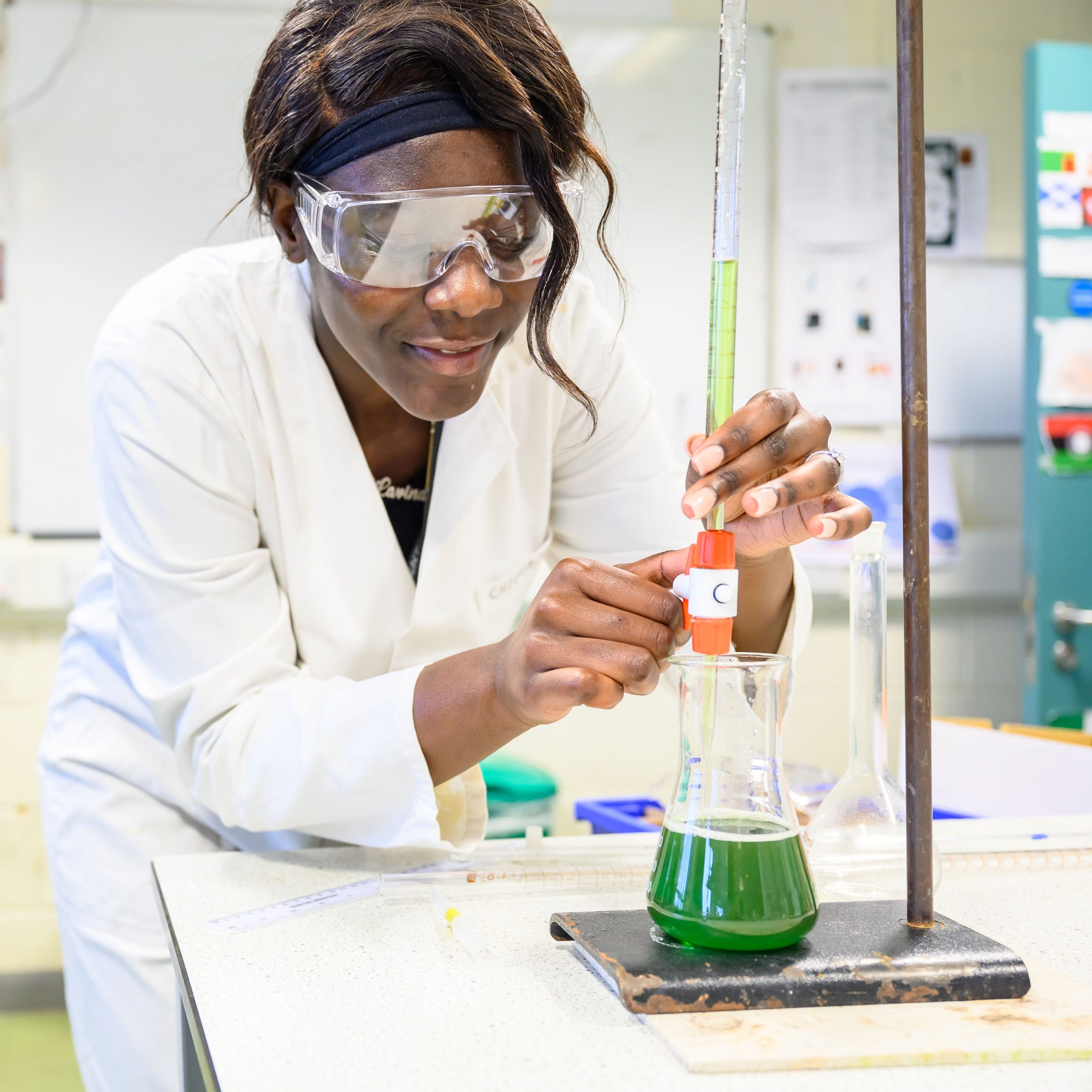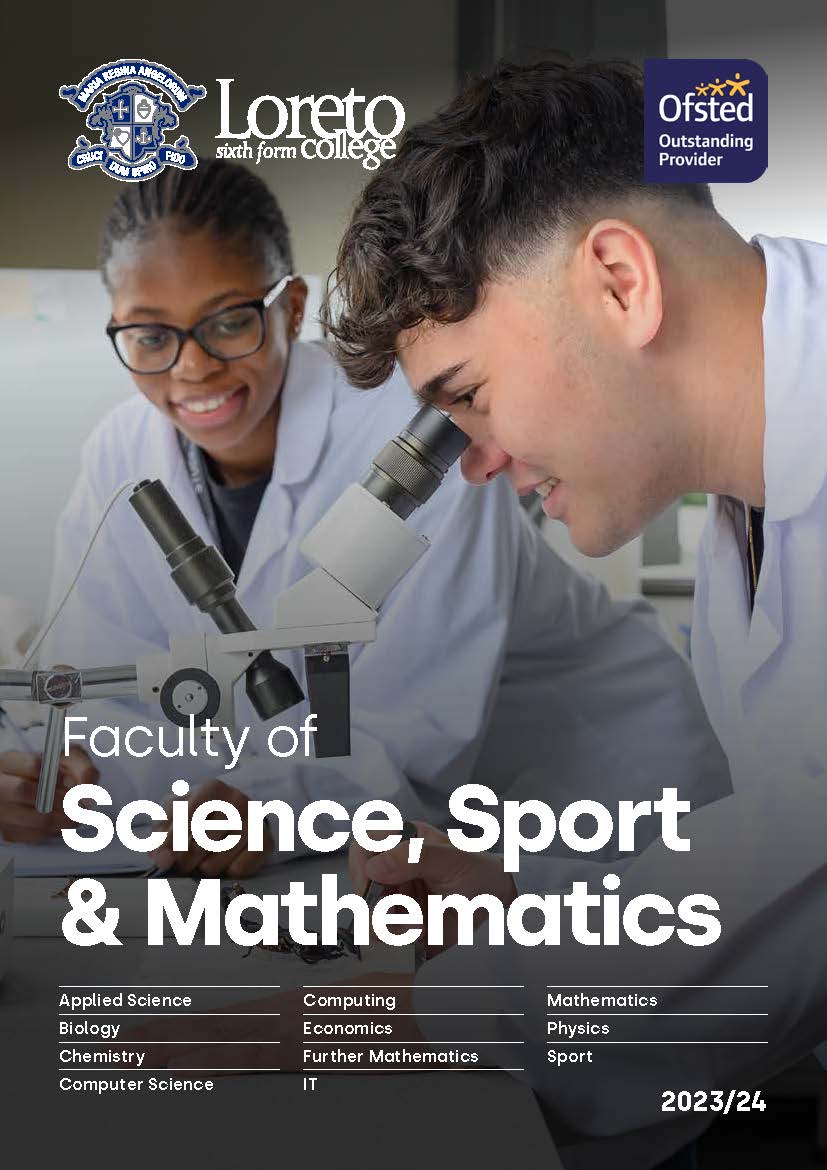Entry Requirements
Click the button to read our faculty brochure or read more about the course below:
- Six GCSEs 9-4 (or A*-C)
- Two from English, Maths OR Science
- Two at least grade 6
Course specific requirements: GCSE Maths (higher tier) grade 9-6 WITH EITHER GCSE Chemistry grade 9-6 OR GCSE Combined Science grades 9,9-6,6
*To choose more than one subject from Maths, Biology, Chemistry or Physics: (minimum of a grade 7 and 6 in the chosen subjects and one other grade 6 in science/maths).

A Level Chemistry
- Do you enjoy problem solving?
- Are you interested in how everything in our world works?
Chemistry is the study of the building blocks of our world. Everything you touch, wear, eat or drink is the result of a chemical process. Your birthday cake would not exist if had not been for a series of reactions which fit together like a jigsaw.
By studying chemistry, you learn how the world works including the importance of organic functionality in pharmaceutical drugs, electrochemistry and the amazing world of transition elements.
Exam board: OCR
What will I study?
Paper 1: Periodic table, elements and physical chemistry
Percentage of total marks: 37%
Method of assessment: Written exam 2h 15 min
This unit looks at practical skills, foundations in chemistry, periodic table, energy, physical chemistry and transition elements
Paper 2: Synthesis and Analytical Techniques (37%)
Percentage of total marks: 37%
Method of assessment: Written exam 2h 15 min
This unit looks at practical skills, foundations in chemistry, organic chemistry and analysis.
Paper 3: Unified Chemistry (26%)
Percentage of total marks: 26%
Method of assessment: Written exam 1h 30 min
This units brings together all aspects of paper 1 and paper 2
Practical Endorsement:
This will be evidenced by meeting a range of key skills in practical work, developed over the two years. Practical skills will be assessed in the written papers (around 15% of the content)
Skills
Chemistry will equip you with a myriad of skills including:
- Problem Solving
- Complex equations and calculations
- Logical Thinking
- Data Analysis
- Independent learning
- Manual dexterity
Careers/destinations
Chemistry students go on to pursue an array of university courses. These include degree courses in medicine, dentistry, veterinary science, chemistry, biochemistry, pharmacy, law, physiotherapy and sports science. There are many careers within research and development, healthcare and engineering that are accessible through studying chemistry.
Chemistry
Why Study Chemistry?
Chemistry is a great subject to study. If you enjoy problem solving and were intrigued about what you learned at GCSE, then Chemistry is for you! Furthermore, studying Chemistry allows you to develop a huge range of skills that you can take forward to any course at University or to any workplace. Studying chemistry opens many doors!
How does studying A level compare to GCSE?
Many of the concepts studied at GCSE come back but we go into more detail. Many of the topics become quite mathematical, like rates and equilibrium, with lots of lovely problem solving. There is lots of exciting organic chemistry too, so if you were intrigued by alkanes and alkenes, get ready for ester and ketones and nitriles...to name just a few.
What are the practicals like?
As part of studying A Level Chemistry all students complete the practical endorsement. Over the two years, you will learn many new technical skills in order to pass this. Practicals are also a great way of putting into context theoretical aspects of the course. It is also a good opportunity for group work and developing your analysis skills. Practicals are fun, you even get to make silver!
What support can I expect if I study chemistry?
There is lots of support available in Chemistry. We have ambassadors who help with our drop-in sessions and you can ask teachers for help if you are stuck on homework or need some hints and tips on how study effectively. You can even email teachers if you need help with anything!
Are there lots of homework and tests?
We use regular homework as a way of allowing students to check their progress. Most of the homework questions are past exam questions so this is all good preparation for the exams. Similarly, end of topic tests and practice assessments allow students and their teachers to see the progress they are making. We give excellent feedback so that students know they are supported and are making progress. We recommend students do at least five or six hours a week of the independent study for Chemistry. We will give you lots of brilliant advice, when you start, so that you are revising actively and effectively.
Do I need to study chemistry to do Medicine?
Many universities require you to have studied A level Chemistry. We would advise students to study chemistry. You will get more advice when you enrol at Loreto College.
What other subject to students normally choose alongside Chemistry?
Popular combinations include...Biology, Mathematics, Psychology, Physics, English, History, Business Studies and languages.
